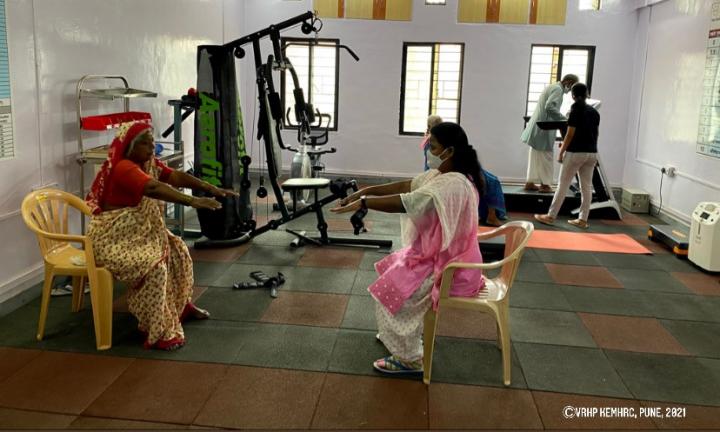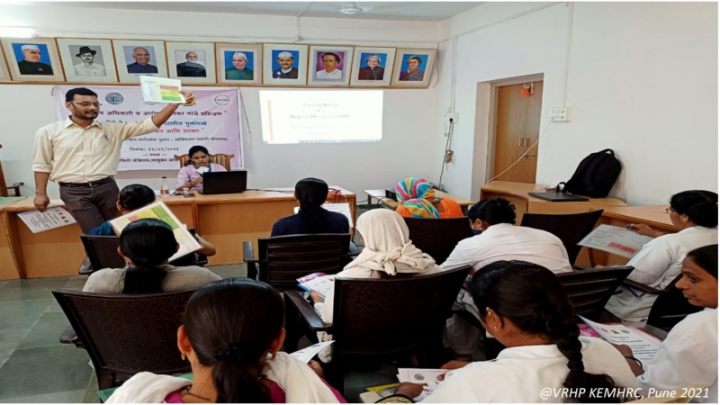RESPIRE impact on rural respiratory health services in Pune, India
RESPIRE projects in Pune, India having a profound impact on the health of rural communities
Two RESPIRE projects based at the Vadu Rural Health Centre, King Edward Memorial Hospital Research Centre (KEMHRC) are having a transformative effect on the delivery of health services for rural communities in Pune, India.
Pulmonary Rehabilitation Centre

Pulmonary rehabilitation (PR) is a proven strategy for patients with Chronic Respiratory Diseases (CRDs) to improve their shortness of breath, overall health and how well they can tolerate exercise. PR also reduces hospital admissions and the mortality of patients with recent exacerbations.
As part of a RESPIRE project, a Pulmonary Rehabilitation Centre was opened at KEMHRC: the first of its kind to be introduced in the rural settings of India. Prior to it opening, there were no dedicated centres catering to the needs of patients with CRDs. The Centre has strengthened the respiratory health services, increasing access to the local rural population.
The RESPIRE project allowed the team to understand and improve the local community’s awareness and knowledge of CRDs. The project allowed the team to reach out to the local population to help them understand how PR could improve their respiratory conditions: preventing exacerbations, improving their quality of life, and the overall community wellbeing.
Diksha Singh, Psychologist, who has coordinated this project at KEMHRC, Pune with support from Dr Harshpreet Kaur (Public Health Scientist) and Dr Dhiraj Agarwal, RESPIRE Research Fellow, was involved in the project. They believe the project has had a truly positive effect on the rural community in Pune. They said:
A total of 50 patients were screen and 46 have been enrolled in the PR program, seven patients have completed their 12-week program. 22 patients have completed 3 weeks, 10 have completed 4-7 weeks six are about to complete their 12 weeks of the PR program. The improvements experienced by participants that are regularly visiting the PR Centre and are compliant to PR have been significant.
Ms Himangi Lubree, RESPIRE Stakeholder Champion based at KEMHRC, Pune played an important role in engaging the various stakeholders in this project.
This PR Centre is currently being funded through RESPIRE, but services will be continued through nominal user fees after the end of the project.
Find out more about the Pulmonary Rehabilitation project
Pulmonary rehabilitation for COPD management in a rural Indian setting
Pulse Oximetry in Child Health Services
Pneumonia is a leading cause of childhood mortality, accounting for 16% of under-five deaths globally, with the majority occurring in low- and middle-income countries.

For the management of common childhood illnesses, including pneumonia, in low-resource settings, the adoption of Integrated Management of Childhood Illness (IMCI) is globally recommended. IMCI classifications depend on the clinical assessment skills of service providers and this subjectivity might lead to misclassification and inappropriate referral or treatment.
Prior to the rollout of the RESPIRE Pulse Oximetry project, the IMCI protocol was rarely followed for the assessment of childhood pneumonia: every case of cough, cold, sore throat and difficulty in breathing was classified as an upper or lower respiratory tract infection or an acute respiratory infection. Pulse oximetry, or the levels of oxygen in the blood, was hardly ever measured for paediatric cases due to the unavailability of paediatric pulse oximeters or trained personnel.
Following the RESPIRE project and its associated training, pulse oximetry is now being used in 6 primary health care clinics by 60 health professionals. This has resulted in pulse oximetry being used along with the IMCI guidelines in 59% of paediatric cases, which has helped in identifying and treating more patients.
Dr Dhiraj Agarwal, RESPIRE Research Fellow based at KEMHRC and was involved in this project. He thinks this project is having a strong impact on the prevention and timely management of childhood pneumonia in Pune. He said:
Prior to the implementation of the RESPIRE Pulse Oximetry (PO) study the IMCI protocol was hardly followed for the assessment of childhood pneumonia. Post-implementation, from March to August 2021 it was observed that in 60% cases PO was used and the IMCI guidelines were followed.
Ms Himangi Lubree, RESPIRE Stakeholder Champion based at KEMHRC, Pune played an important role in engaging the various stakeholders in this project.
Find out more about the Pulse Oximetry in Child Health Services project
Introducing pulse oximetry in IMCI services in Pune district, India

